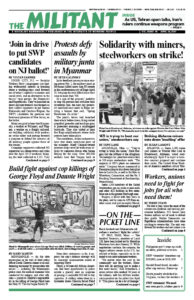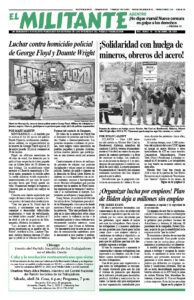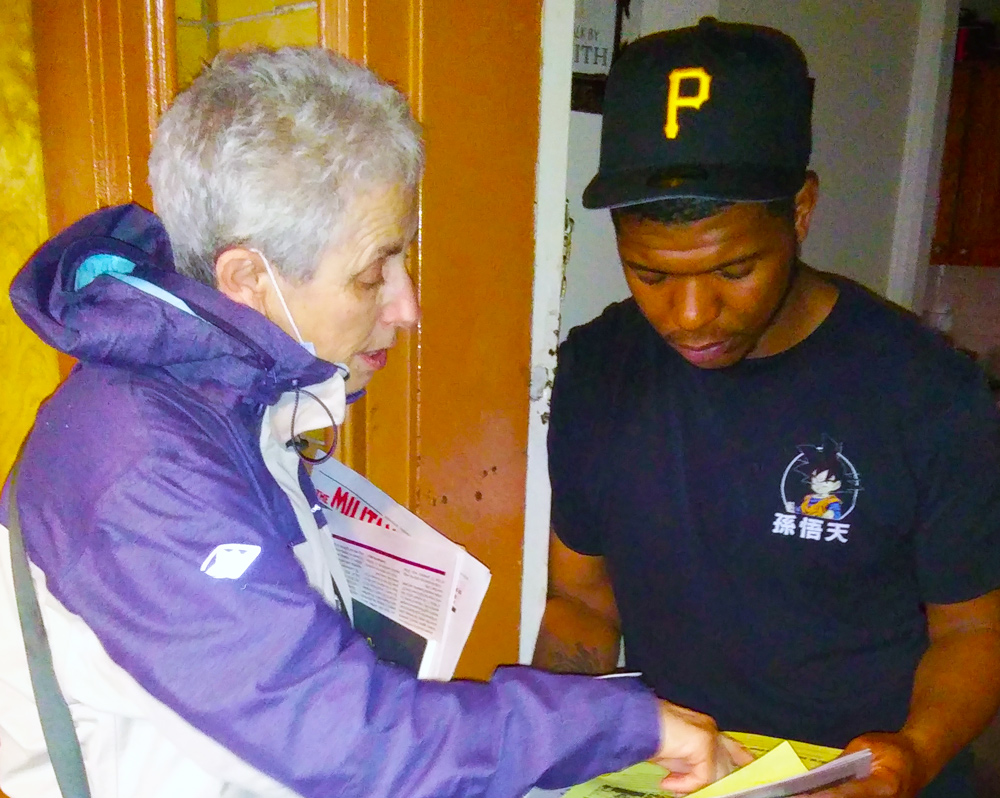UNION CITY, N.J. — Socialist Workers Party campaigners are finding widespread interest in learning about a working-class road forward out of today’s capitalist economic and social crisis, and an alternative to the bosses’ twin parties, the Democrats and Republicans. They’ve knocked on doors and met workers and farmers as they collect signatures to put Joanne Kuniansky and Candace Wagner, the SWP’s candidates for governor and lieutenant governor of New Jersey, on the ballot.
Many are glad to hear that Kuniansky, a worker at Walmart, and Wagner, a worker on a freight railroad, are building solidarity with workers on strike today and putting forward a program to defend the interests of all working people against those of the bosses.
Campaign supporters collected 342 signatures in a dozen towns and cities over the April 10-12 weekend, bringing the total collected to 1,315. They plan to get another 185 signatures to be able to turn in nearly double the state’s requirement in early May. Working people and youth they’ve met have purchased 65 subscriptions to the Militant, and 33 books by leaders of the Socialist Workers Party and other revolutionaries.
“I need a job. The stimulus money doesn’t even keep you afloat,” Kyondra Porterfield, a single mother with twin 2 year olds, told Kuniansky when the SWP candidate knocked on her door in Elizabeth. With businesses still shuttered because of the pandemic and affordable child care hard to come by, Porterfield has not been able to go back to work.
“I’ve met many women like you who’ve been forced to stay home because there is no affordable child care, or schools are closed,” Kuniansky said. “That’s why workers and our unions need to fight for a government-funded public works program to put millions to work building the things we need, like schools, child care facilities and roads, at union-scale wages.” Porterfield signed to put Kuniansky on the ballot.
Just a few doors down, Lorinda Williams invited Kuniansky into her apartment. “I’ve been disabled since 2014,” Williams said, but still has not been able to get government disability payments, an enormously difficult proposition for workers. “Every month you have to choose between feeding the kids or paying the rent,” she said. “Of course, feeding the kids comes first.”
Williams had worked in a nursing home and would like to go back to work. “But nobody wants to hire someone who can’t stay on their feet all day,” she said.
“Everyone who wants to work should be able to get a job,” Kuniansky said. “If workers controlled production, we would organize work so that everyone can contribute to producing the things we need. But the capitalists, when they don’t think we are producing enough profits for them, just use us up and spit us out.”
Kuniansky also met 22-year-old Tasim Cook, who told her he thought that bosses and many in government look down on working-class youth. “They don’t think you can be any more than you already are,” he said.
Cook is not keen on the government’s “stimulus” money. “It just makes people dependent,” he said. He’d rather be working. “You connect with more people and different kinds of people.”
“That’s right,” Kuniansky agreed. “We need to be back at work so that we can fight together and stand up to the bosses.” She pointed to the example set by striking workers at ATI steel and coal miners at Warrior Met in Alabama.
“I have a friend who told me it’s different in Cuba,” Cook said. “That’s true,” Kuniansky answered. “In 1959 workers and farmers in Cuba overthrew the Batista dictatorship and took power into their own hands.” Cook and Kuniansky traded phone numbers to continue the discussion.
The next day Kuniansky spoke to Gladys Cornieo in Passaic. “I’m caring for 10 children and grandchildren,” Cornieo said, “and there is no school for any of them. There is zoom — but they learn nothing on it.”
“We live in a society ruled by the wealthy few who do not care about what working people face,” Kuniansky said. “They don’t care if we get an education. They just want workers who will follow orders. For education that really meets our needs, we need to fight for a workers and farmers government.”
Fight for shorter workweek
“Workers and our unions need to fight for a shorter workweek with no cut in weekly pay to share the available work around,” SWP campaigner Terry Evans said when he and Elizabeth Lariscy met Miguel Perrez at his apartment in Newark April 11. “The SWP campaign offers proposals to tie together workers who are employed and unemployed, to fight for what we need.” Perrez lost his job at a food factory when the owners moved production to Israel. “The government should stop companies moving jobs abroad,” he said, “or make them pay when they do.”
“Bosses go where our labor is cheapest. We can’t stop that,” Evans said. “But workers need to organize wherever we are to defend ourselves and build unions and to back the struggles of fellow workers worldwide.”
“You’re different to the other parties. You don’t say vote for me and I’ll do everything for you,” Perrez noted as he signed up to put Kuniansky on the ballot.
“A lot of people around here hate the government,” he said. “But they need to hear what you are saying. That way they’ll start to get organized to do something about it.”
During the weekend a lively campaign forum here was addressed by Kuniansky, Wagner and Róger Calero, the SWP’s candidate for New York City mayor. Six of the 22 participants were attending a Militant Labor Forum for the first time after hearing the SWP was organizing to get on the ballot. Aparna Chowdhury, a middle-school teacher who met Wagner at a protest against police brutality earlier in the month, came and then joined a campaign team in Trenton the next day.
“No one else is addressing the problems and challenges of labor,” she said. “You are the strongest supporters of the labor movement.”
To join campaign teams in New Jersey or other places across the country, contact the nearest party branch.


